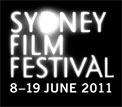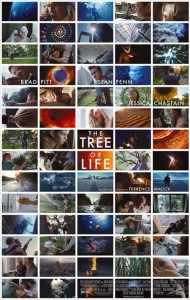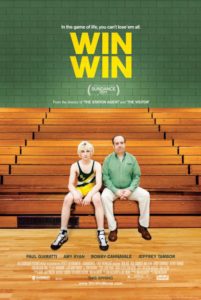 There were many great films debuting or enjoying a second run at the 58th Sydney Film Festival on the first Tuesday of the Festival, but there was one film that was being anticipated a little more than the others. Terrence Malick’s The Tree of Life saw its official Australian debut at the State Theatre, and will no doubt remain a film that will divide audiences for some years to come. Despite the long weekend officially being over, there were still sold-out sessions for Le quattro volte, The Trip and I’m Not Dead Yet, proving that if you screen them, they will come. – Tuesday June 14, 2011
There were many great films debuting or enjoying a second run at the 58th Sydney Film Festival on the first Tuesday of the Festival, but there was one film that was being anticipated a little more than the others. Terrence Malick’s The Tree of Life saw its official Australian debut at the State Theatre, and will no doubt remain a film that will divide audiences for some years to come. Despite the long weekend officially being over, there were still sold-out sessions for Le quattro volte, The Trip and I’m Not Dead Yet, proving that if you screen them, they will come. – Tuesday June 14, 2011
Russian cinema has been making something of a welcome return in the last few years, from innovative horror (Night Watch) to moody isolationist thrillers (How I Ended This Summer). Alexander Zeldovich takes a leaf out of the Russian sci-fi great Andrei Tarkovsky (Solaris) in this vision of a future world of 2020, where Russia is booming thanks to its mineral deposits and a strict social hierarchy is maintained. A group of elite citizens travel to the mountain to expose themselves to the rays of the youth-giving Target, an abandoned astrophysics plant, before returning to civilisation to expose themselves…repeatedly. What starts as a genuinely intriguing sci-fi concept, built around the search for a futuristic fountain of youth, goes off the rails when it begins to believe its own importance as a moral musing on the perils of power. Could have made a great porno.

Target does not currently have an Australian release date.
Following a theme of pregnant caretakers at the Festival (after Iran’s A Separation), this more off-beat take on life and its persistence, even after death, comes to us from Spain’s Fernando Léon de Aranoa’s (Mondays in the Sun, Princesas). A disarmingly black take on the importance we place on mortality, Amador has a number of touching and restrained moments of humour, warmth and sadness, although it often finds itself struggling to maintain the momentum that it needs for total audience engagement. Although Marcela (Peruvian actress Magaly Solier) makes an interesting subject, the camera tends to linger a little too long in the constant shuffling between Marcela and Amador’s respective apartments. The theme of immigration is clearly an important one to Aranoa, having previously tackled unemployment and prostitution (both touched upon in this film), but the conceit of the events that take place within Amador’s apartment sideline any real impact that the presentation of those issues may have here.

Amador does not currently have an Australian release date.
For a director that infamously took two decades off between his second and third features, the dreamlike Days of Heaven and the war polemic The Thin Red Line, ambitious would hardly seem like an apt description for the enigmatic Terrence Malick. Yet how else would one describe a piece of art that seeks to unravel the very mysteries of existence? The narrative elements of The Tree of Life come from the 1950s O’Brien family sequences, with a powerful and often frightening turn from Pitt and the opposite emotive qualities coming from relative newcomer Jessica Chastain. Yet to think of The Tree of Life as a period drama would be tantamount to calling Stanley Kubrick’s 2001: A Space Odyssey, to which there are some parallels, “just a science-fiction film”. Indeed, it is difficult to initially get a handle on Malick’s latest piece, as there is very little to use as a point of reference in the discussion of it. Malick has not so much recreated the Big Bang and the first sparks of life in the universe as actually filmed them with a magical lens that only he possesses. The lengthy interplays of light and sound that bookend the film do not act as separate pieces so much as seamlessly integrate themselves into the fragmented narrative, just as the wondrous has become the everyday in our modern setting. Malick’s film speaks to the tensions arising between Creationism and evolution, with Sean Penn’s character contemplating all of these notions from the almost clinically-shot contemporary setting, as if the understanding of these concepts will make the pain of loss and the absence of life easier to bear. Yet while The Tree of Life seemingly begins with a death, it is ultimately a celebration of life and a reminder of its intrinsic beauty.

The Tree of Life is released in Australia on June 30, 2011 from Icon.
Much of the work of Paul Giamatti has been spent in gaining empathy from an audience with an increasingly unlikable series of characters. Yet there is something about Giamatti’s permanent hangdog expression that encourages pathos in equal doses as the discomfort his rage-prone characters (Sideways, Barney’s Version) elicit. So it is refreshing to see the character-actor turned consummate downtrodden leading man give us a softer side with a character who, despite trying to perpetrate fraud on a senile old man and his family, is a genuinely nice person. Given director Tom McCarthy’s work immediately preceding this, it is difficult to reconcile this “nice” direction with the people involved in making it, but the fit proves to be a surprisingly comfortable one. There are no narrative surprises in this otherwise steadily-plotted comedy, but an excellent cast lifts this out of the ordinary. Substituting wrestling for the typical basketball/baseball/football motif that would typically steer the troubled teenager on course, McCarthy’s familiarity with the subject gives a feeling of authenticity coupled with genuine emotional rigour. As Giamatti’s schemes begin to unravel, the inevitable denouement rears its tame head, and McCarthy doesn’t always steer clear of the emotional minefield and dramatically tidy conclusions that rite-of-passage films tend to leave us with. Yet McCarthy maintains a consistent lightness to the film that will ultimately please audiences while maintaining the integrity and truth to his characters that he is known for. That’s a real ‘win-win’ situation.

Win Win is released in Australia on 18 August, 2011 from Fox.
The Sydney Film Festival continues until June 19, 2011.
For more news and reviews from the Sydney Film Festival, check out our coverage of previous days of the 2011 event:









No Responses